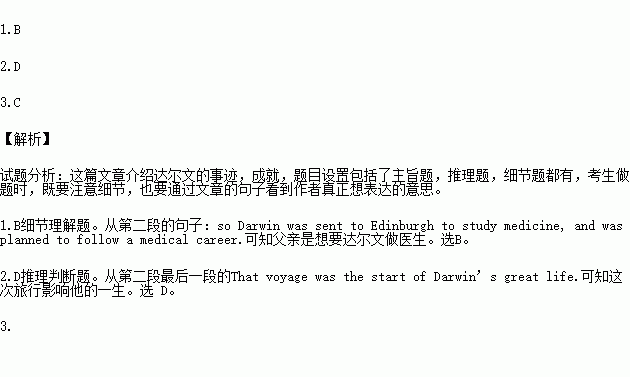题目内容
As a boy, Charles Robert Darwin(达尔文) collected anything that caught his interest: insects, coins and interesting stones. He was not very clever, but Darwin was good at doing the things that interested him.
His father was a doctor, so Darwin was sent to Edinburgh to study medicine, and was planned to follow a medical career. But Charles found the lectures boring. Then his father sent him to Cambridge University to study to be a priest. While at Cambridge, Darwin’s interest in zoology and geography grew. Later he got a letter from Robert FitzRoy who was planning to make a voyage around the world on a ship, the Beagle. He wanted a naturalist to join the ship, and Darwin was recommended(推荐). That voyage was the start of Darwin’s great life.
As the Beagle sailed around the world, Darwin began to wonder how life had developed on earth. He began to observe everything. After he was home, he set to work, getting his collection in order. His first great work The Zoology of the Beagle was well received, but he was slow to make public his ideas on the origin of life.
Later Darwin and Wallace, another naturalist who had the same opinions as Darwin, produced a paper together. Darwin’s great book “On the Origin of Species by Means of Natural Selection”(《物种起源》) appeared. It attracted a storm. People thought that Darwin was saying they were descended from monkeys. What a shameful idea! Although most scientists agreed that Darwin was right, the Church was still so strong that Darwin never received any honors for his work.
Afterwards, he published another great work, The Descent of Man. His health grew worse, but he still worked. “When I have to give up observation, I shall die,” he said. He was still working on 17, April, 1882. He was dead two days later.
1.Darwin’s father sent him to Edinburgh to _____.
A. make him like natural history
B. make him become a doctor
C. let him change his hobbies
D. have him give up his collection
2.According to the passage, Charles Darwin’s whole life was changed by _____.
A. his study at Cambridge University
B. his collection of coins
C. the naturalists at Cambridge
D. the voyage of the Beagle
3.The underlined part “they were descended from monkeys” probably means “_____”.
A. they gave monkeys life
B. they were different from monkeys
C. they were developed from monkeys
D. they had to live with monkeys

